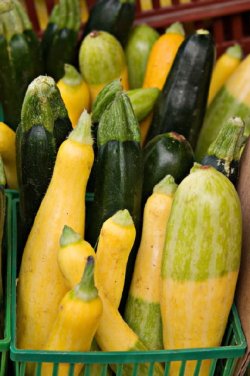 The poor, maligned, misunderstood Brussels sprout. Was there ever a vegetable so loathed?
The poor, maligned, misunderstood Brussels sprout. Was there ever a vegetable so loathed?
It’s too bad really, because with astronomical amounts of vitamin K and vitamin C (273% and 161% respectively of the daily recommended intake) they’re a nutritional powerhouse. And that’s not counting the high levels of folate, Vitamin A, manganese and fibre. They count as those darky leafy greens that we’re all supposed to be eating more of, since they’re full of sulforaphane, a nutrient believed to have anti-cancer properties.
Brussels sprouts really did originate in Belgium, although a forerunner of the plant was known in Roman times. They made it to North America around 1800 when French settlers brought them to New Orleans.
When confronted with unharvested sprouts, most people don’t recognize them, assuming these “little cabbages” grow in the ground individually, when in fact they grow along a long thick stem with large cabbage-like leaves at the top. While they taste similar to cabbage, sprouts are, in fact, milder. They get their reputation of a bitter, sulphurous taste mostly from being overcooked. Steaming or boiling for 6-7 minutes is usually enough, and the standard of cooking them to mush has undoubtedly ruined an otherwise fabulous vegetable for a lot of people.
 I think cranberry sauce is one of my favourite things about Thanksgiving dinner. Bright red and sweet, it’s like a little treat with all that meat and veg.
I think cranberry sauce is one of my favourite things about Thanksgiving dinner. Bright red and sweet, it’s like a little treat with all that meat and veg. Sometimes, I’m not so bright. Because when I made up the list of fruit and veg to include in this column, I mostly based it on what would be in season. Which is the point of the whole thing (we’ll start covering meat and dairy and spices and such in the winter after the fall harvest), except for the fact that I didn’t really think too much about recipes.
Sometimes, I’m not so bright. Because when I made up the list of fruit and veg to include in this column, I mostly based it on what would be in season. Which is the point of the whole thing (we’ll start covering meat and dairy and spices and such in the winter after the fall harvest), except for the fact that I didn’t really think too much about recipes. Poor old much maligned corn. It gets a bit of a bad rap these days, seeing as how it ends up in so many processed foods, and how it’s been genetically modified up the yin yang. And then there’s the whole ethanol issue. It’s too bad, because there’s nothing that says summer more than ears of sweet corn with the silks still wet, shucked, kissed with some boiling water and then slathered in butter. Made better only by the accompaniment of a lobster or two… but I digress.
Poor old much maligned corn. It gets a bit of a bad rap these days, seeing as how it ends up in so many processed foods, and how it’s been genetically modified up the yin yang. And then there’s the whole ethanol issue. It’s too bad, because there’s nothing that says summer more than ears of sweet corn with the silks still wet, shucked, kissed with some boiling water and then slathered in butter. Made better only by the accompaniment of a lobster or two… but I digress.
 Summer squash (aka. zucchini) can be both a delight and a bane to home gardeners. A delight because zucchini are a fruitful fruit (while treated as a vegetable in the kitchen, zucchini and all squash are technically fruit) – they’re easy to grow and the fruit grows quickly, they’re also a bane because they’re almost too prodigious and home gardeners tend to find themselves with more zucchini than they know what to do with. In the peak of the season some will even take to leaving bags of summer squash on their neighbours’ doorsteps under cover of night just to get rid of some of their harvest.
Summer squash (aka. zucchini) can be both a delight and a bane to home gardeners. A delight because zucchini are a fruitful fruit (while treated as a vegetable in the kitchen, zucchini and all squash are technically fruit) – they’re easy to grow and the fruit grows quickly, they’re also a bane because they’re almost too prodigious and home gardeners tend to find themselves with more zucchini than they know what to do with. In the peak of the season some will even take to leaving bags of summer squash on their neighbours’ doorsteps under cover of night just to get rid of some of their harvest.


